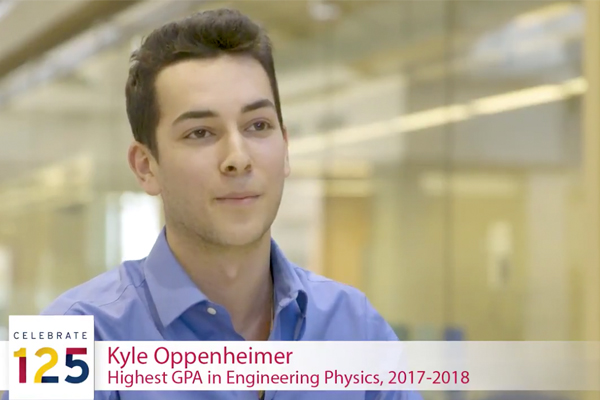Getting to know Engineering Physics
The Engineering Physics program allows students to apply the knowledge of fundamental physical principles underlying modern technology and processes. Students will study a strategic combination of math, physics, and engineering courses from a chosen specialty area. Courses in quantum mechanics, laser optics, and nanotechnology will help prepare students for an engineering career at the leading edge of technology. Students will acquire advanced problem-solving and instrumentation skills and will be able to apply their superior mathematical, analytical, and abstract-thinking abilities to modern engineering challenges. Engineering Physics opens up a wide range of career options.
In the Engineering Physics program, core courses provide students with fundamental physical principles and theoretical tools for professional practice as well as a firm foundation in modern experimental techniques. Each year of the program has a course in experimentation and a design course. To relate these abilities to other engineering disciplines, the program provides 4 options:
- Mechanical
- Electrical
- Materials
- Computing
These options provide a sequence of courses in other engineering departments and thus provide career or graduate studies opportunities in both engineering and applied physics.
Engineering Physics Menu
What Can I learn from Engineering Physics?
- Proficiency in mathematics and numerical modelling with courses in math and physics
- Time and resource management - taught formally in class and then applied in your projects
- How to work independently and in a team on a project - a group design project is undertaken every year and a thesis in the final year
- Ability to solve complex problems using your broad scientific knowledge
- You gain practical skills as an engineer, and back them up with the deep knowledge of a scientist
- Ability to make careful measurements with sophisticated equipment in laboratory classes
- Proficiency with modern physics allowing you to work with tomorrow's technologies
Engineering Physics Major Maps
For the listing of Major Maps, including Engineering Physics, visit:
Awards and Scholarships
Program Contact Information
Dr. James Stotz
Chair of Engineering Physics
Email: jstotz[at]queensu.ca
Phone: 613-533-6817
Melissa Balson
Undergraduate Program Assistant
Email: 4mjb5[at]queensu.ca
Phone: 613-533-2706
Degree Options
Can specialize in Mechanical, Computing, Electrical or Materials Engineering
- Bachelor of Applied Science
- Bachelor of Applied Science with Professional Internship
Get Involved!
Useful Links for Eng Physics Students
Kyle Oppenheimer - Dean's Scholar

 Queen's 2015 Nobel Prize in Physics
Queen's 2015 Nobel Prize in Physics